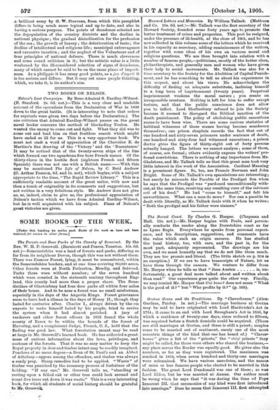Howard Letters and Memories. By William Tana*. (Methuen and Co.
10s. 6d. net.).--Mr. Tallack was the first secretary of the Howard Society, founded some forty years ago to promote the better treatment of crime and pauperism. This post he resigned, under the pressure of ill-health, at the close of 1901, and he has now collected in this volume some of the letters which he received in his capacity as secretary, adding reminiscences of the writers, together with some ideas of his own on various moral and religious questions. We are thus brought into relation with a number of famous people,—politicians, mostly of the better class, philanthropists, and generally men and women who have given their help to social movements. Mr. Tallack was also for a time secretary to the Society for the Abolition of Capital Punish- ment, and he has something to tell us about his experiences in this respect, and about his views. He acknowledges the difficulty of finding an adequate substitute, inclining himself to a long term of imprisonment (twenty years). Perpetual imprisonment weakens the moral nature ; you create an irresponsible creature. Nothing is left for him to suffer except torture, and that the public conscience does not allow you to inflict. Lord Shaftesbury refused to join the Society because it seemed to disregard the Biblical sanction of the death punishment. The policy of abolishing public executions seems to have been wise. There are some curious statistics of habitual witnesses of these scenes having become murderers themselves ; one prison chaplain records the fact that out of one hundred and sixty-seven prisoners under sentence of death, one hundred and sixty-four had witnessed executions; a prison doctor gives the figure of thirty-eight out of forty persons actually hanged. The letters we cannot analyse ; some of them, of course, are formal; others evidently express the writers' pro- found convictions. There is nothing of any importance from Mr. Gladstone, and Mr. Tallack tells us that this great man took very little interest in the work of the Association. Cardinal Manning is a prominent figure. So, too, are Francis Newman and John Bright. Some of Mr. Tallack's own speculations are interesting; but surely he misreads the Parable of the Prodigal Son when he says that the Prodigal was "pardoned unconditionally with- out, at the same time, receiving any resulting cure of the intrinsic evil of his deed." He had "come to himself," and felt his unworthiness. What can a man do more ? Nor can a parable be dealt with literally, as Mr. Tallack deals with it when he writes : "Both the prodigal and his father were sinners."














































 Previous page
Previous page